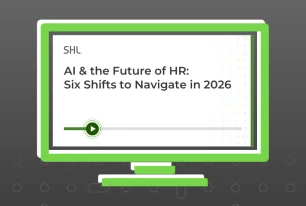Rethinking Graduate Hiring in the Age of AI
Graduate applications are surging, AI is changing the game, and internships are more valuable than ever. Discover how both candidates and HR teams are evolving their approach to early careers hiring.
Share
The AI-powered application explosion
HR teams have to grapple with the power and peril of AI, attempting to stay ahead of changing candidate behaviors and the ongoing transformation of HR processes, tools, and people. With Graduate application volumes increasing by 59% year-on-year¹, both candidates and hiring teams are feeling the impact.
Candidate viewpoint:
Candidates are increasingly turning to AI for help in the application process from everything from writing cover letters to mass applying for roles. Together with the increase of hybrid and remote roles, competition for each role has increased, making it harder for graduates to stand-out.
HR team impact:
HR are under pressure to screen more applications at record speed, risking missed opportunities or rushed decisions. HR personnel are investing in future skills, and embracing new tech, with 81% noting that AI has increased speed and efficiency¹, but there is new complexity as organizations debate how and when AI-informed applications fit their values. Organizations that succeed in early careers hiring strategies have found the right balance between tech-driven processes and fair candidate comparison.
The authenticity challenge in selection
When resumes and responses are more refined than ever, the challenge in graduate hiring shifts to uncovering genuine ability. HR teams need to ensure their selection process can separate practiced polish from true skills and values.
Candidate viewpoint:
Candidates seeking an edge turn to tech but face scrutiny over authenticity, with an expectation to demonstrate skills and cultural fit in structured interviews. The rise in reflective and personal questions means authenticity matters; graduates need to be prepared to discuss real experiences, not just rehearse AI-generated answers.
HR team impact:
HR must improve accuracy and reliability in selection. Decision-making is now about validating beyond what’s on paper with more focus on durable behavioral skills, rather than perishable technical skills. With the right assessment tools that have effective proctoring, hiring teams can uncover skills and potential that lead to long-term success.
Why internships beat guesswork every time
Internships and placements are a proven springboard for skills development and workplace readiness. For an early careers cohort that may be working for the first time, it provides exposure to the company culture, operations and processes. Organizations can see how new interns cope with the pressures of the working environment, and how well they fit into their new teams and roles.
Candidate viewpoint:
Graduates are now seeking organizations and opportunities that align with their personal beliefs and values, meaning on-the-job experience is highly valued. Rather than a long training and onboarding process, getting stuck into real workplace scenarios and having responsibility early provides motivation, positive attitudes, and sharper skills development.
HR team impact:
Internships provide early, reliable ways for leaders to evaluate skills and cultural fit of new starters, providing a strategic talent pipeline and reducing risks in hiring decisions. Effective placements supports not just short-term productivity but ongoing employee engagement and skill-building in areas that make a difference in-role.
Turning hiring data into career gold
Retention and growth start at recruitment but continue well beyond. Smart HR teams are using assessment insights over time to nurture development, building the workforce of tomorrow with today’s data.
Candidate viewpoint:
Graduates benefit when hiring and development are linked. Feedback and insight gained during selection can help define career pathways from day one, providing clarity for learning and career progression. A skills-focused environment rewards adaptability and encourages continuous improvement.
“Ultimately, the reason people are happy, or they stay engaged and they enjoy working in your company, is usually about growth.”
Josh Bersin, Founder & CEO, The Josh Bersin Company
HR team impact:
By using hiring data to inform ongoing development needs, HR can help create a more agile workforce that is open to internal mobility, and more resilient to change. Retention improves when employees see a clear path for learning and career progression, especially when skills are recognised. By measuring the skills, potential, and AI-readiness of new hires, development initiatives can be targeted at areas where skills gaps exist and upskilling will make a real difference.
Want to see more pitfalls to avoid when it comes to graduate hiring?
View our infographic, Five Reasons Your Early Careers Hiring is Costing You Talent, for a snapshot of what to avoid when developing your graduate hiring strategy.









